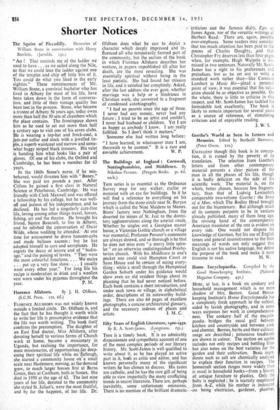THIS N a timely book. It is an admirably dispassionate
and sympathetic account of one of the most complex periods of our literary history. Mr. Scott-James is well qualified to - write about it, as he has played an active part in it, both as critic and editor, and has known personally many of the significant writers he has chosen to discuss. His tastes are catholic, and he has the rare gift of being able to view impartially the many conflicting trends in recent literature. There are, perhaps inevitably, some unfortunate omissions. There is no mention of the brilliant dramatic
briticism and the famous dia'ry, Ego, ot James Agate, nor of the versatile writings of Herbert Read. There are, again, possible over-emphases. Some readers may consider that too much attention has been paid to the poems of Charles Doughty, and that Christopher Fry deserves less than four pages when, for example, Hugh Walpole is dis- missed in two sentences. Naturally Mr. Scott. Jameshas a right to his preferences and prejudices, but as he set out to write a standard work rather than—like Constant Lambert in Music Ho—plead a personal point of view, it was essential that his valu- ation should be as objective as possible. On the whole, there is little to criticise in this respect, and Mr. Scott-James has tackled his formidable task excellently. The book is likely to remain important for several years as a source of reference, of stimulating criticism and of enjoyable reading.






































 Previous page
Previous page